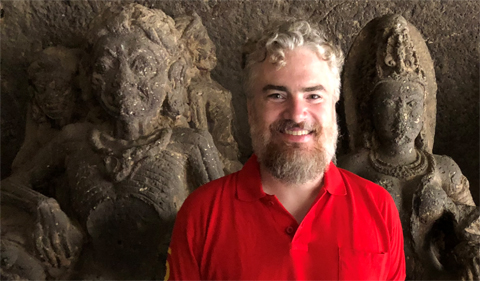By Dr. Brian Collins
Chair of Classics & Religious Studies
As of this semester, the Department of Classics & World Religions will become the Department of Classics & Religious Studies, and the World Religions major and minor will soon be renamed the Religious Studies major and minor.
Soon the prefixes CLWR (Classics-World Religions), CLAS (Classics), and CLAR (Classical Archaeology) will all be replaced by the single prefix CARS. What, you may ask, is the reasoning behind this name change? And what is the difference between “World Religions” and “Religious Studies?”
Actually, the academic study of religion goes by many names in universities and colleges. Just in the state of Ohio, there are departments of Religion (Ohio Wesleyan), Religious Studies (Dayton), and Comparative Religions (Miami). There is a story behind this confusion of nomenclature. It begins in 1963, when the U.S. Supreme Court ruled 8-1 in Abington School District v. Schempp (374 U.S. 203) that, while compulsory Bible study or prayer in publicly funded schools was unconstitutional, schools could teach religion as an object of study in the same way they would teach literature, art, or philosophy. Although sociologists, anthropologists, and historians had been researching religion in university settings since the 19th century, before Abington v. Schempp religion as an academic discipline was only really taught at private, religiously affiliated institutions as part of training for Christian clergy. The degrees offered by these programs were in “Divinity” or “Theology,” two ways (one from Latin and the other from Greek) of referring to the study of God.
This old style of studying religion is akin to what one might learn in Sunday School or Hebrew School or an Islamic madrasa. In these contexts, what you are learning is how to be a practitioner of your own religion. Often this is in preparation for some kind of ritual to formalize your membership in a religious body, like a Hindu boy’s upanayana ceremony, a Catholic’s confirmation, or a Jewish girl’s bat mitzvah. Sometimes it is to deepen your faith, as in weekly Bible studies sponsored by churches.
But studying religion in a university, as allowed by the Supreme Court, is quite different. In our classes, we are not learning how to be better Muslims, or the proper understanding of the Trinity, or even whether religious claims are “true” or “false.” We are not engaged in the study of God, but the study of people. Therefore, we study religion as a dimension of the human experience, and one with profound consequences on how people think and act. (To get an idea of how profound those consequences are, go look at Religious Studies scholars on Twitter using the hashtag #capitolsiegereligion to discuss the role played by Evangelical Christianity, Neopaganism, and even Hindu Nationalism in the riots the U.S. Capitol earlier this month.)
After the Supreme Court decision in 1963, colleges and universities began building religion programs at a rapid pace, some within existing departments and some as new, stand-alone departments. At Ohio University, it was Professor of Philosophy Troy Wilson Organ (1912-1992) who got the ball rolling. Originally trained as a scholar of Aristotle, Organ became interested in India and Hinduism in the 1950s. He spent two years there (1958-59 and 1965-66) studying on a Fulbright Senior Research Grant and began teaching and researching Hinduism extensively. Over the time Organ spent first as chair of the Philosophy Department and then as a Distinguished Professor until he retired in 1978, the department hired faculty who specialized in religion, like Professor George Weckman, who had trained with one of the founders of the University of Chicago Divinity School’s “History of Religions” program, Mircea Eliade. Creating a home for the study of religion within the Philosophy Department was in line with the actions of many other universities at the time (departments of Philosophy and Religion are not uncommon in the United States).
From the 1960s onward, the Philosophy Department offered courses on New Testament, Old Testament, Hinduism, Buddhism, Islam, Daoism, and other such subjects, but never developed a major separate from the Philosophy major. In 2003, partly in order to develop such a major, three members of the Philosophy Department who specialized in religion (George Weckman, Gene Blocker, and Elizabeth Collins) left and joined the Department of Classics (which had existed since at least 1818), after which it became the Department of Classics and World Religions, which would offer a major and minor in World Religions.
The name “World Religions” was chosen to distinguish the work done in the department from the old style of studying religion in seminaries and divinity schools, emphasizing that the focus would be on the side-by-side study of religions from around the world, rather than Christian theology. But over time, this phrasing became confusing. First of all, it is ambiguous. Is a “world religion” a religion one can find all over the world, like Islam? Or simply any and every religion in the world? Secondly, it is used much less frequently than “Religious Studies,” which is the most common and recognizable way of describing our discipline, and is therefore somewhat out of sync with the rest of the field.
Religious Studies is an interdisciplinary field, meaning that there are many ways to study religion. For example, you can choose to read sacred texts like the Rig Veda, study sacred sites like the Temple Mount in Jerusalem, learn the history of religious institutions like the Catholic Church, or simply talk to religious people. As we thought about renaming ourselves, we considered the diversity of approaches in our department: Cory Crawford is trained as an archaeologist; Loren Lybarger employs the anthropological method of ethnography in his research; Brian Collins relies heavily on comparison in his teaching and scholarship; Jaclyn Maxwell, whose academic home is actually the History Department, is an historian of early Christianity; and Myrna Perez Sheldon, who also teaches in the Women’s, Gender, and Sexuality Studies program, is as much an historian of science as an historian of religion. And it was also apparent that within the department the distinction between “Classics” and “World Religions” was artificial. Why should our course on Greek and Roman Religions be designated CLAS rather than CLWR? And why should studying Greek mythology be so different from studying Sanskrit mythology, especially since the two languages are so closely related as members of the Indo-European language family?
With this in mind, we have decided to become the Department of Classics & Religious Studies (CARS) to make ourselves recognizable for students who want to study religion academically (i.e., non-religiously). But non-religiously does not mean “anti-religiously.” We believe religious people can study religion objectively just as effectively and with just as much benefit as non-religious people can. In fact, we have sent two recent graduates to study theology at Harvard and Yale, while sending another to study Osteopathic Medicine here at Ohio University. Our name change also comes out of our desire to finish what was started in 2003 and become a unified and cohesive department that represents a range of disciplines and areas of study. So whether you want to read the Christian Bible or the Iliad with a critical eye, study the connections between religion and violence, or learn what Buddhism is all about, we hope you will come join us at the newly designated Department of Classics & Religious Studies.




















Comments